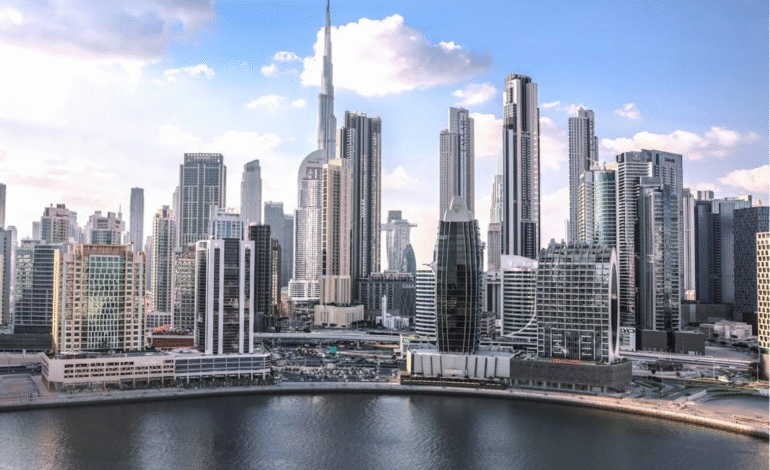UAE’s Economic Growth Projected at 4.6% in 2025, Says World Bank

The United Arab Emirates (UAE) is on track for sustained economic growth over the coming years, according to the latest Gulf Economic Update (GEU) from the World Bank. The report, based on data available as of 1 June 2025, predicts that the UAE will achieve 4.6 percent growth in 2025, with the pace stabilising at 4.9 percent during 2026 and 2027.
This positive outlook reflects the success of the UAE’s strategic economic diversification, with non-oil sectors increasingly powering national growth.
UAE’s Non-Oil Sectors Drive Economic Expansion
The World Bank highlights the significant role of non-oil sectors in the UAE’s economic performance. These sectors are forecast to grow by 4.9 percent in 2025, supporting the country’s ambitions for a resilient and diversified economy.
Industries such as tourism, logistics, technology, and manufacturing are among the key contributors. Government strategies like Operation 300bn, the Dubai Economic Agenda D33, and the Abu Dhabi Industrial Strategy continue to promote innovation, sustainability, and private sector participation.
GCC Economic Growth Trends for 2025 and Beyond
The Gulf Cooperation Council (GCC) region as a whole is projected to see stronger economic growth over the medium term. After achieving 1.7 percent growth in 2024, up from 0.3 percent in 2023, GCC countries are expected to expand by 3.2 percent in 2025 and 4.5 percent in 2026.
This recovery reflects resilient non-oil sector activity, supported by government reforms and investments in economic diversification.
Country-Level GCC Growth Forecasts
The World Bank provides specific projections for individual GCC economies:
Bahrain is expected to maintain steady growth at 3.5 percent in 2025. Kuwait’s economy is predicted to recover, reaching 2.2 percent in 2025. Oman will likely see growth increase to 3 percent in 2025, from 1.7 percent in 2024, with further gains to 3.7 percent in 2026 and 4 percent in 2027. Qatar is projected to grow at 2.4 percent in 2025, before accelerating to an average of 6.5 percent during 2026–2027. Saudi Arabia is expected to grow by 2.8 percent in 2025, with an average of 4.6 percent in 2026–2027.
These forecasts underline the varied pace of recovery across the GCC, shaped by national strategies and reform efforts.
The Role of Fiscal Policy in Supporting Growth
The World Bank report “Smart Spending, Stronger Outcomes: Fiscal Policy for a Thriving GCC” highlights the importance of effective government spending. The analysis shows that public spending has helped stabilise GCC economies, especially during challenging periods.
According to the report, a 1-unit increase in fiscal spending can boost non-hydrocarbon output by 0.1 to 0.45 units, demonstrating the positive impact of targeted expenditure on economic performance.
Private Sector, Reforms, and Investment as Growth Drivers
The UAE’s non-oil growth is driven by reforms that enhance the business environment, attract investment, and foster entrepreneurship. The World Bank notes that private consumption, foreign direct investment, and structural reforms are key contributors to growth across the GCC.
In the UAE, these measures are reinforced by large-scale projects, digital transformation, and pro-business policies that continue to attract regional and international investors.
Regional Challenges and the Need for Diversification
While the growth outlook is positive, the report warns of challenges linked to global trade uncertainty and potential slowdowns in major economies. Volatile oil prices also pose risks to budget stability across oil-exporting countries.
The World Bank advises GCC governments to accelerate diversification efforts and improve regional trade integration. These steps are vital for reducing dependence on oil revenues and safeguarding against external economic shocks.
World Bank Commends GCC Resilience
Safaa El Tayeb El-Kogali, World Bank Division Director for GCC countries, highlighted the region’s progress in managing global challenges while advancing economic diversification. She stressed that strategic fiscal policies, smart investments, and a focus on youth employment, innovation, and entrepreneurship are critical for ensuring long-term prosperity and stability.
Her remarks align with the World Bank’s call for continued reforms and innovation to maintain economic momentum.
Sustainable Development and Smart Spending Are Key to Success
The World Bank’s report concludes that smart spending, fiscal discipline, and investments in innovation and sustainability will be central to the GCC’s future economic success. By focusing on these areas, the UAE and its neighbours can build inclusive, resilient economies that are better equipped to navigate global shifts.








3 Comments
[…] UAE and Hungary share a mutual interest in fostering economic growth through diversified partnerships. The agreements signed during the visit are expected to boost […]
[…] centre in the Middle East, Africa, and South Asia (MEASA) region but also aligns closely with the Dubai Economic Agenda D33, which seeks to position the city among the top four global financial centres by […]
[…] are becoming more important in the Gulf region’s economy. Governments are encouraging people to start new businesses and innovate. This exhibition supports […]
Comments are closed.